-
GHANA REPORT | June, 29, 2023
Vibrant Private Sector Crucial To West Africa’s Economic Growth– Coverage of #SankalpWestAfrica2023 in Ghana Report
Read More -
Capital News Online | June, 29, 2023
1st Sankalp West Africa Summit 2023 Held In Ghana- Coverage of #SankalpWestAfrica2023 in CapitalNews
Read More -
JOY 2 | June, 29, 2023
Sankalp Summit held; rewards impact enterprises- Coverage of #SankalpWestAfrica2023 and the Winners of the 1st Sankalp West Africa Awards in Joy News Online
Read More -
Modern Ghana | June, 29, 2023
Sankalp West Africa Summit calls for collaboration to drive entrepreneurship, poverty eradication- Coverage of #SankalpWestAfrica2023 in Modern Ghana News
Read More -
The Hindu Business Line | April, 18, 2023
India seeks global alignment around innovative SDG startups: Listen to Vineet Rai, Founder, Aavishkaar Group, and member of the ‘G20 Start Up 20 Engagement Group’ on the HBL Podcast.
Read More -
Sankalp Dhaka Summit | March, 29, 2023
1st Edition of the Sankalp Dhaka Summit 2023: Award Winners, Media Coverage & Updates
Read More -
ForbesIndia | December, 12, 2022
Sankalp Global Award Winner of 2022, Numer8’s Founder and CTO featured in Forbes India’s List of Self- Made Women aka W-Power List 2022
Read More -
inc42 | November, 13, 2022
Why Venture Capitalists are doubling down on the Impactech sectors: Bikram Mahajan, Intellecap featured on Inc42
Read More -
CXO Today | October, 29, 2022
CXO Today Exclusive Interview with Bandhu, Sankalp Global Awards 2022 Winner that uses tech to enables users to succeed and thrive in their livelihoods
Read More

Vibrant Private Sector Crucial To West Africa’s Economic Growth– Coverage of #SankalpWestAfrica2023 in Ghana Report
Karnika Yadav, Intellecap Africa, Arielle Molino, Sankalp Africa, Flaubert Mbiekop, IDRC & Paul Chater, Perspecta Group
Tune in Now –https://www.theghanareport.com/vibrant-private-sector-crucial-to-west-africas-economic-growth-2/
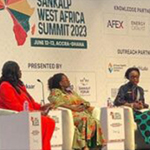
1st Sankalp West Africa Summit 2023 Held In Ghana- Coverage of #SankalpWestAfrica2023 in CapitalNews
View full article
Sankalp Summit held; rewards impact enterprises- Coverage of #SankalpWestAfrica2023 and the Winners of the 1st Sankalp West Africa Awards in Joy News Online
View full article
Sankalp West Africa Summit calls for collaboration to drive entrepreneurship, poverty eradication- Coverage of #SankalpWestAfrica2023 in Modern Ghana News
Tune in Now –https://www.modernghana.com/news/1237884/sankalp-west-africa-summit-calls-for-collaboration.html

India seeks global alignment around innovative SDG startups: Listen to Vineet Rai, Founder, Aavishkaar Group, and member of the ‘G20 Start Up 20 Engagement Group’ on the HBL Podcast.
Tune in Now –http://ow.ly/NgOE50NHUMq

1st Edition of the Sankalp Dhaka Summit 2023: Award Winners, Media Coverage & Updates
Dhaka, March 22nd, 2023: In a significant milestone, Sankalp Forum, an initiative of Intellecap, and one of the Global South’s largest convening on impact entrepreneurship and sustainable development, hosted its 1st Edition of the Sankalp Dhaka Summit, at the Sheraton Dhaka on the 19th March 2023.
Presented by Aavishkaar Group and Intellecap, the Dhaka Summit positively engaged 50+ Global & Regional Speakers and over 180 pioneering change-makers from the development ecosystem and impact community, to discuss, define, and drive forward the critical levers of entrepreneurial success, across 12+ interactive sessions.
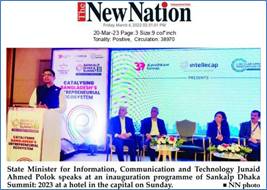
This year’s summit, was themed around ‘Catalysing Bangladesh’s Entrepreneurial Ecosystem” and the Keynote Speaker Zunaid Ahmed Palak, State Minister, ICT Division, Govt of Bangladesh highlighted the govt’s commitment to supporting startups and shared his enthusiasm for collaborating further the Aavishkaar Group.
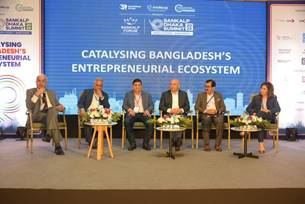
The Opening Plenary with Jayesh Bhatia, MD, Intellecap, Vineet Rai, Founder and Chairman, Aavishkaar Group, Dr. Naresh Tyagi, Chief Sustainability Officer, Aditya Birla Fashion & Retail Ltd., Sami Ahmed, MD, Startup Bangladesh, ATM Tahmiduzzaman, United Commercial Bank PLC. and Ms. Sonia Bashir Kabir, Founder & MD, SBK Tech Ventures, further emphasized about building the entrepreneurial ecosystem.
At the exclusive press meet during the Summit, Vineet Rai, Founder and Chairman, Aavishkaar Group spoke about the limitless opportunity that startups and enterprises in the region can uncover. Sami Ahmed, MD, Startup Bangladesh shared his vision as well.
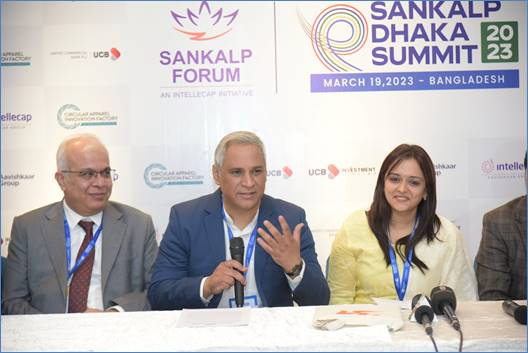
Jayesh Bhatia, Managing Director, Intellecap announced the Bangladesh Green Enterprises Ecosystem Initiative which will raise USD 250 million dollars for 1000 Impact Enterprises by 2030, and will help create 10000 jobs in the country. He also emphasized Intellicap’s engagement with the Government initiatives, and offered to bring in experiences from India to bear on the Bangladesh well-articulated Smart Vision 2041 championed by the Honourable Prime Minister.
Jayesh also referred to the work being done by Intellecap on the Renewable Energy (RE). Solar energy presents huge impact and investment potential with solar power potential making up 50% of the RE target for 2041.
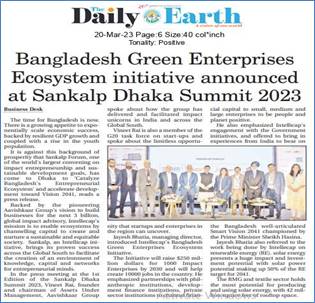
Venkat Kotamaraju, Director, Circular Apparel Innovation Factory (CAIF) spoke about the significant work CAIF is doing in the RMG space and about the 4th CAIF Conclave, where CAIF through its session, featured some of the top names in the sector, highlighted ideas that can help accelerate the green transition of MSMEs in the RMG Sector and deliberated around the imperative need for skilling for a green and circular transition and shared ideas on how to mobilize and build this ecosystem, all with a view to elevate Bangladesh’s position in the global value chain.
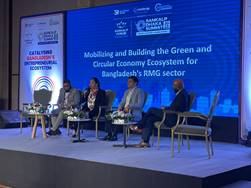
The summit’s key partners were United Commercial Bank PLC (Bangladesh), UCB Investments Ltd. (UCBIL), Startup Bangladesh Ltd., Bangladesh Angels Network, International Finance Corporation (IFC), Doen Foundation, UNDP, UNICEF, Aditya Birla Fashion and Retail Ltd. (ABFRL) and Global Alliance for Improved Nutrition (GAIN) , to name a few. The Business Standard was the exclusive media partner to the Summit.
The Summit also witnessed a fireside chat with Vineet and Arif Khan, Vice Chairman, Shanta Bank Asset Mgmt, and compelling sessions on topics such as Promoting Climate Smart and Sustainable Agriculture in Bangladesh, led by International Finance Corporation (IFC), Promoting responsible business approaches for achieving health outcomes by UNICEF, Role of SMEs in Sustainable WASH outcomes by Water.org, Future of Health Care Models by Better Stories and Business Innovations to transform food systems in Bangladesh by Global Alliance for Improved Nutrition (GAIN). In addition, there were learning sessions by way of Master classes and a LIVE deal room where regional and global investors connected with private sector enterprises to facilitate growth capital.
This year the winners of the 1st Sankalp Dhaka Awards 2023 were Wander Woman (2nd Runner-up) PriyoShop (1st Runner-up) and iFarmer (Winner).The other finalists were MommyKidz, Bhumijo, Garbageman and Vertical Innovations.
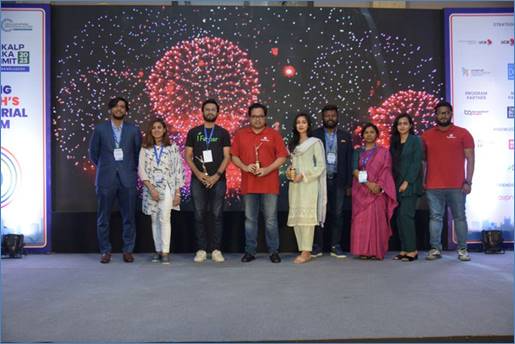

10th Sankalp Africa Awards Winner 2023
Nairobi, March13th, 2023: Sankalp Forum, an initiative of Intellecap, one of Africa’s largest convening on impact entrepreneurship and sustainable development, hosted its 10th Edition of the Sankalp Africa Summit, at the Kenya School of Monetary Studies, from the 1st and 2nd of March 2023.
Every year, the Summit recognizes and rewards high impact enterprises from a pool of promising finalists, in the Africa region which are tackling key development challenges. The finalists also get the opportunity to pitch their enterprises to a jury panel comprising of eminent business leaders and investors.
This year the winners of the 10th Sankalp Africa Awards 2023 were four most innovative young entrepreneurs in Africa, whose ideas are well poised to deliver significant impact outcomes, whilst solving some of the most complex social challenges. The 10 outstanding finalist impact enterprises representing the region were– Vetsark, an agri startup, Zivanae Afya Bora, a healthcare startup and ThinkBikes, a Circular Economies startup, all from Nigeria, Omajalands, an agri startup from Zimbabwe, Hearty Engineering, an agri startup from Ethiopia, Kwikbasket and Afriagrimark, both agri startups from Kenya, Agki Medical Laboratory, a healthcare startup from Tanzania and Legendary Foods, an agri startup from Ghana.

The Sankalp Africa Awards 2023 Winner was Legendary Foods from Ghana. A food tech startup, Legendary Foods (LF) is on a mission to produce West & Central Africa’s most cost-effective, nutritious, resource-efficient and accessible form of protein, palm larvae, with technology and farming systems proudly built in Ghana.
The First Runner Up was Vetsark Limited from Nigeria. An agri financing startup, Vetsark helps farmers and agribusinesses in Africa access finance, increase productivity, and improve their profitability. They bridge the gap between farmers and financial institutions and is helping unlock the potential of African agriculture by providing farmers with the financing and support they need to grow their businesses.
The Second Runner Up was Agki Medical Laboratory from Tanzania. A healthcare startup, Agki Medical is working to solve the problem of Anemia in pregnant women and children under the age of five living in rural communities. It uses an Electric car to offer a digital mobile dispensary for rural patients by providing affordable laboratory tests for diagnosis, clinics, medications for treatments and Free Health education.
In a unique format the Fourth Winner, called as the ‘Sankalp Ecosystem Award’ is given through a voting process from practitioners from the developmental ecosystem. This year the winner was Hearty Engineering from Ethiopia, an agri tech startup that provides an Intelligent and IoT supported technology device that helps monitor and treat Livestock’s health thereby showing how innovation can make significant impact when wrapped in technology.
“Sankalp today, in its 10th year in Africa, celebrates a decade of impact and the Sankalp Africa Awards has truly been a regional trailblazer when it comes to identifying and supporting hundreds of impact enterprises whose business promise and potential is a crucial to solving economic and development challenges. This year we were once again inspired by the ideas and the cutting edge innovation of our winners, each of whom demonstrate the ability to drive action and influence positive outcomes,” said Arielle Molino, Sankalp Lead and AVP Intellecap Africa
The Summit, supported by Visa Foundation, GIZ, Villgro Africa, FSD Uganda, US International Development Finance Corporation (DFC) and Energy Catalyst, engaged over 1,400 stakeholders, from 70+ countries around the World, including participants from 40+ African countries.

Sankalp Global Award Winner of 2022, Numer8’s Founder and CTO featured in Forbes India’s List of Self- Made Women aka W-Power List 2022
Mumbai Dec12th -The 2022 Forbes India W-Power List featured women who are breaking stereotypes, dismissing doubters and leading change.
Sankalp Global Summit Award Winners of 2022 in the agriculture category, Numer8’s Founder Devleena Bhattacharya, and CTO Nandhini Karthikeyan, was featured in this Power list.

Numer8 from India is a startup that helps small fishing communities by providing timely marine and weather advisory, backward and forward market linkages and financial connections through their mobile application.
On the revenue side Numer8 grew from Rs 6 lakh in 2019 to Rs 1.5 crore in 2022. It aims to hit Rs 10 crore in revenue in the next three years.
Numer8’s new focus area is seaweed cultivation as an alternative source of income for the fishing community, especially for women. It aims to use satellite data-based advisories to analyse seaweed sites for enhancing its cultivation, and distribute seaweed as companies focus on sustainable businesses.
To Read the W-Power List of 2022-Click Here

Why Venture Capitalists are doubling down on the Impactech sectors: Bikram Mahajan, Intellecap featured on Inc42
Mumbai, Nov 15th – At the 14th Edition of the Sankalp Global Summit 2022 , one of the main plenary sessions was around the topic, ImpacTech Investing: Dichotomy or Paradigm shift?, led by Bikram Mahajan, Partner, Intellecap Investment Banking Group.

Inc42 in conversation with Bikram featured the story, “Why Venture Capitalists are doubling down on the Impactech sectors” which takes that conversation ahead and highlights how when it comes to investment themes, impact and technology have always been discrete buckets for investors. Bikram also opines on how the belief that VC investing is primarily driven by financial objectives whereas impact investing is only about seeking people and planet outcomes has led to such misconception, and the truth about how impact and technology have never been two unrelated paradigms. Both styles of investing are deeply intertwined and form a continuum rather than a dichotomy.
The Rise And Rise Of Impact & Tech Sectors
A decade ago, it was easy to dismiss the impact sector as a collection of not-for-profit organisations supported by foundations and philanthropies. We’ve come a long way since then, and the for-profit impact sector is now formally recognised around the world, and impact investing is a well-defined asset class.
The global impact AUM crossed $1 Tn across asset classes in 2022. This impact AUM is managed by 3,349 organisations, where fund managers account for the majority of them. Concurrently, the startup sector observed $134 Bn invested in 5,200 startups since 2014 in India and a non-trivial $2.5 Tn in over 100,000 startups worldwide.
A new class of impact startups challenging the traditional impact business models also emerged during the last few years, piggybacking on disruptive innovation, an often quoted and generally accepted investment driver in the mainstream startup sector.
Equipped with state-of-the-art technology, impact startups exhibited the promise of accelerated growth translating into superior impact and investment multiples than their traditional impact counterparts.
A few impact investors also broadened their investment themes to join the bandwagon of investing in technology startups, even considering impact in retrospect on occasion, and a few startups that were ignored by mainstream VC funds went to the extreme of impact washing to seek impact pools of capital.
The Impact Vs. Tech Dichotomy
With 107 unicorns and one of the world’s highest unicorn minting velocities, India has only 11 impact unicorns, with no unicorns in sectors such as agritech or cleantech.
One could argue that asset managers have made unprecedented commitments to impact AUM allocation, fueling its 11% growth since 2016. However, the private markets AUM grew from $5.2 Tn in 2016 to $9.8 Tn in 2021 during the same period at a CAGR of 16%.
The gap widens when we consider that the $4.2 Tn funding required to achieve 17 Sustainable Development Goals by 2030 is just 1.1% of assets held by financial institutions.
The predicament intensifies when we combine this statistic with a survey by JP Morgan and GIIN, which found that over 55% of impact funds deliver at least market rate returns, as well as a study by MSCI, Inc. validating the stylised fact that companies with higher ESG ratings have higher profitability, lower systematic risk and lower tail risk.
Impactech Investing: A New Paradigm
From the perspective of an investor, one way to resolve this seemingly obvious conundrum is to recognise “impact” as an investment approach conspicuously integrated into a fund manager’s investment thesis rather than an asset class. Impact investing, according to the Global Impact Investing Network (GIIN), necessitates intentionality and impact measurement.
Using this globally accepted definition, Intellecap’s digital investment banking team estimated that 40% of the world’s 1,200 unicorns can be classified as Impactech startups.
The truth is impact and technology have never been two unrelated paradigms. Both styles of investing are deeply intertwined and form a continuum rather than a dichotomy. The global ESG transition being extensively embraced by tech giants, unicorns and investors across asset classes demonstrates this phenomenon.
For a startup, impactech is often misconstrued as reluctantly espousing backward fitting impact metrics as an after-thought for enhancing investment worthiness or employing emerging technologies one-dimensionally to deliver impact. Scaling up is an inherent objective of every venture, whether digital or impact, intending to solve a grand challenge.
Impactech is about designing business models from the ground up which leverage both technology and impact as sustainable competitive advantages to achieve scale. The next 3 Bn presents the largest underpenetrated market for digital businesses, whereas impact ventures are transforming their business models for scalability through digital inclusion.
Hence, impactech comprises not only a healthcare company employing technology as an enabler for scale and efficiency but also a deeptech startup exploiting big data and AI/ML to digitise and interpret diagnostic reports.
Analogously, not all edtech startups can be classified as impact and not all enterprisetech startups are non-impact. Perhaps the correct approach is to evaluate each startup with intentionality and a measurement lens, rather than defining impactech as an all-encompassing sector.
The impactech dimension has always been ingrained in the investment thesis across strategies, sectors, and stages. Reclassifying impactech as a distinct and broad-based investment theme would simplify investments at the intersection of impact and technology to empower digital businesses that solve global challenges.

CXO Today Exclusive Interview with Bandhu, Sankalp Global Awards 2022 Winner that uses tech to enables users to succeed and thrive in their livelihoods
Bandhu from India is a mobile platform that uses tech to enable low-income workers to access accommodation and livelihoods and was the Winner in the Livelihoods category at Sankalp Global Awards 2022 at the 14th Edition of the Sankalp Global Summit 2022.
CXOToday engaged in an exclusive interview with Mr. Rushil Palavajjhala – Co-Founder & CEO Bandhu.
What are the origins of Bandhu?

Rushil Palavajjhala, Bandhu’s co-founder and CEO, closely understood the plight of migrant workers As an architect, where he spent several hours every day on construction sites and also faced labour-supply challenges as a project manager/employer. He later worked for two years on implementing affordable housing under the PMAY (Pradhan Mantri Awas Yojana) government initiative for five towns, finding that over 90% of slum-dwellers, often migrants, lived as renters and hence could not avail of the government benefits intended for them. Rushil investigated the root causes of this vulnerability in his Master’s thesis at Massachusetts Institute of Technology (MIT). His thesis approached this issue using geospatial data science, through coursework across multiple departments at MIT and Harvard and field interviews in urban and rural areas of India’s Ahmedabad-Mumbai corridor. His findings pointed to very actionable solutions, and directly led to the creation of Bandhu.
What is the role of tech in the Bandhu?
Bandhu sees technology as a bridge to improving the livelihoods and living conditions of our users, as we uncover new insights in the informal economy where data has been typically scarce and unreliable. While it solves classic problems of information asymmetry; integrates markets to rationalize pricing, its impact is in optimising choices for our users across millions of possibilities and tradeoffs ( eliminating adverse outcomes)- which would be impossible without our innovation. Simply put, technology forms a critical part of how we help users not just succeed but thrive in their livelihoods. It allows us to offer migrant workers multiple bundled offers of jobs and housing tailored to their needs. Secondly, given that many of our users are going digital for the first time in their lives, we’ve designed to minimize decision fatigue , by triangulating and predicting choices and then nudging. Much of this also involves processing large volumes of user-uploaded image and video data, using AI. We take an inclusive approach to technology access- solving for multiple challenges in human – technology interaction and access – including the barriers in literacy and technical capacity that users across India traditionally face. As a smartphone is often a family or community asset, we enable multiple users to operate from the same device. Given that many in our target market may not always have access to a smartphone or the ability to operate unfamiliar apps, we provide some functions of our platform via an IVR number or a WhatsApp chatbot. Our multilingual module allows us to connect to users across various regions and languages. The data generated by transactions on the platform allows Bandhu to offer livelihood improvements to users at below-market rates. For example, various cashflows in our ecosystem could be securitized to cross subsidize offerings or integrate LendTech of InsureTech. Repeated transactions by workers throughout the search for jobs and housing allows us to better tailor opportunities to these workers. We use an approach to “training the trainers” in technology, using on-ground champions to rapidly and organically increase our customer acquisition rates and producing significant positive externalities in the process of making affordable rental housing transparent and efficient.
How you plan on providing upskills options to the migrant workers?
Yes, both through video-based in-app skilling and evaluations and through partnerships with organizations specialized in upskilling. For example, we may identify that a worker has been performing well in a job on our app based on ratings and the worker’s own provided videos, and connect that worker to nearby skilling organizations or place them in learning on the job kind of situations.
How many “Bandhus” have you helped till date?
60,000 users have been able to receive necessary information to make choices/ decisions, 3,000+ job matches achieved; we’ve added 15,000 beds to the supply of affordable rental housing in the last six months provided by extremely low-income settlements who see this as subsistence income, 70+ women trained as champions to onboard properties – seen family incomes increase by 50 to 100%. Bandzhu has won an award in the 14th Sankalp Global Summit 2022 in the The Future of Worker and livelihood category
What are your future growth and expansion plans for Bandhu?
We are currently expanding the platform to new geographies including Mumbai-Goa, Bangalore, and Hyderabad. By 2024 we will have a recognizable presence in these metro areas. We intend to reach 300,000 users by the end of 2023; 3M by the end of 2025. This growth will be driven by the behaviour of women micro-entrepreneurs in low-income communities who adopt the app and train others under them, AS well as by micro- contractors who will be able to solve their working capital woes through Bandhu , expand their businesses simply by ensuring workers are paid digitally and on time – unlocking massive opportunities for LendTech , InsureTech and SalesTech etc. for the next billion users.
What technology innovations do you foresee for Bandhu?
Bandhu’s key technology innovation is creating bundled jobs and housing offers through Artificial Intelligence (AI) and Machine Learning (ML) algorithms. The offer packages we provide to workers are derived from their activity on the platform such as jobs completed, self-attested and vetted skills, photo/video data, desired housing type, and searches/ratings over time. These data points allow us to make sophisticated recommendations to workers on when, where, and even whether to migrate from among millions of permutations and combination – eliminating ones with adverse outcomes. For example, if few opportunities exist in a worker’s home area that match their skill set, skill level, and desired housing situation, we can offer a menu of migration options to the worker in other localities. Such data triangulation has never been observed before for this target group, and there is a vast potential for data monetization and fintech to cross-subsidize and serve the bottom of the pyramid.
Read the interview of Bandhu on CXO Today – Click Here
Reports & Policies
Our Impact Map

Sign up for our newsletter
© Copyright 2018 Intellecap Advisory Services Pvt. Ltd. - All Rights Reserved




